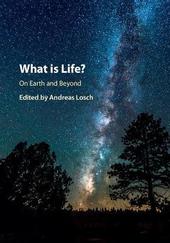
|
What is Life? On Earth and Beyond: On Earth and Beyond
Hardback
Main Details
| Title |
What is Life? On Earth and Beyond: On Earth and Beyond
|
| Authors and Contributors |
Edited by Andreas Losch
|
| Physical Properties |
| Format:Hardback | | Pages:328 | | Dimensions(mm): Height 254,Width 180 |
|
| Category/Genre | Philosophy of religion
Philosophy of science
Astronomy, space and time |
|---|
| ISBN/Barcode |
9781107175891
|
| Classifications | Dewey:113.8 |
|---|
| Audience | | Professional & Vocational | |
|---|
| Illustrations |
Worked examples or Exercises; 12 Halftones, color; 4 Halftones, black and white
|
|
Publishing Details |
| Publisher |
Cambridge University Press
|
| Imprint |
Cambridge University Press
|
| Publication Date |
13 July 2017 |
| Publication Country |
United Kingdom
|
Description
Approaches from the sciences, philosophy and theology, including the emerging field of astrobiology, can provide fresh perspectives to the age-old question 'what is life?'. Has the secret of life been unveiled and is it nothing more than physical chemistry? Modern philosophers will ask if we can even define life at all, as we still don't know much about its origins here on Earth. Others regard life as something that cannot simply be reduced to just physics and chemistry, while biologists emphasize the historical component intrinsic to life on Earth. How can theology constructively interpret scientific findings? Can it contribute constructively to scientific discussions? Written for a broad interdisciplinary audience, this probing volume discusses life, intelligence and more against the background of contemporary biology and the wider contexts of astrobiology and cosmology. It also considers the challenging implications for science and theology if extraterrestrial life is discovered in the future.
Author Biography
Andreas Losch is an award-winning theologian, specialising in the dialog between the sciences, philosophy and theology, and he is currently coordinating the project 'Life beyond our planet?' at the Center for Space and Habitability, Universitat Bern, Switzerland. Losch is a member of the Center of Theological Inquiry, Princeton, New Jersey and he serves in the councils of the European Society for the Study of Science and Theology and in the Karl Heim Society. He is also editor-in-chief of a German forum for dialog between the sciences and theology.
Reviews'All the contributions are well written and extensively referenced. They fit together well and give the impression of careful editing. At the end, do we really know what Life is? In his Introduction, the editor quotes the NASA working definition, 'life is a self-sustained chemical system capable of undergoing Darwinian evolution', and in his excellent Conclusion writes that the evolution of the special relation of its constituents might be the key to understand it. If we did find traces of life beyond Earth, we might learn more about the beginnings of its evolution here.' Peredur Williams, The Observatory: A Review of Astronomy 'The book is a stimulating read for an open-minded interdisciplinary audience that is eager to learn more about very different concepts of life - binary or not so much so - and intelligence. ... The contributors to this volume succeed magnificently in an effort of vulgarisation of their highly specified research areas and the editor succeeds splendidly in not only juxtaposing these contributions but providing a frame that allows for an exchange of ideas, where not the one truth is held valid over all others but where syntheses may emerge and where a progress in knowledge and understanding develops step-by-step. Even though the reader may not be inclined to follow each and every line of argument, the political context of scientific developments, and their philosophical foundations are highlighted and the red thread of the initial question 'what is life?' surely lead to an individual gain of insights for every reader.' Ulrike Bohlmann, German Journal of Air and Space Law
|